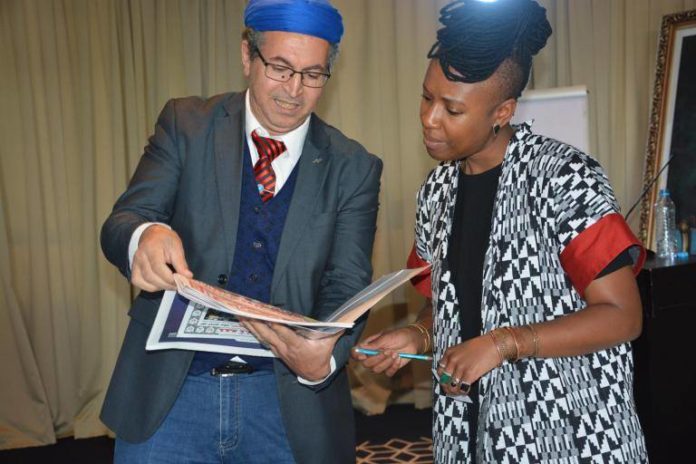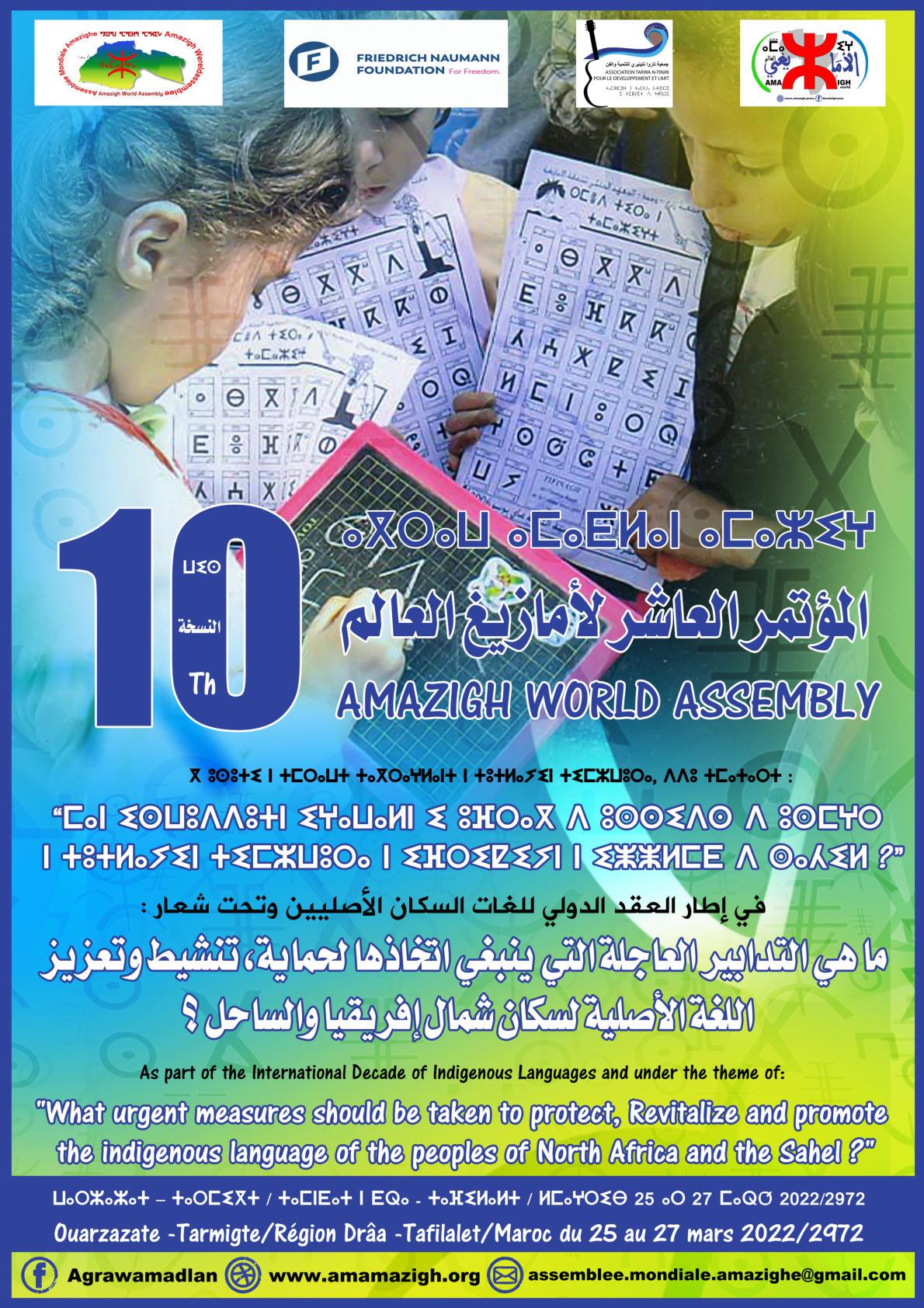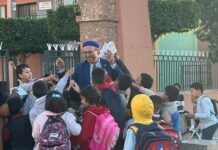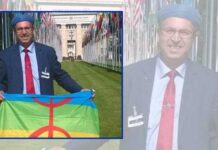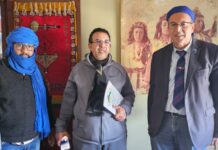Ms. Tendayi Achiume, the United Nations Special Rapporteur on contemporary forms of racism, racial discrimination, xenophobia and related forms of intolerance, who visited Morocco from 13 to 22 December, had meetings with Moroccan authorities, and human rights institution heads. She also had consultation sessions with members of civil society in Rabat, Tangier, Tetouan, Agadir and Casablanca. on Friday, 14th December she had a meeting with various civil society non-governmental organizations at the headquarters of the United Nations delegation in Morocco in Rabat.
The Amazigh World Assembly, represented by its President Rachid Raha, its Deputy Chairwoman for Morocco, Mrs Amina Ibnou-Sheikh, and Ahouli Montacer, President of Toubkal Forum for Amazigh culture and human rights. After having explained their points of view to Ms. Tendayi Achiume, they provided her with several reports concerning the violation of the rights of Amazigh citizens and communities, such as the political trial of the Rif People’s Movement detainees, the problem of collective and tribal lands and the violence against the Amazigh Cultural Movement (MCA) militants, together with several annexes. Here is the content of the main report:
To Her Excellency Mrs. Tendayi ACHIUME, United Nations Special Rapporteur on contemporary forms of racism, racial discrimination, xenophobia and intolerance
Subject: Is the Kingdom of Morocco a racist State against its Amazigh indigenous peoples?
Excellency,
The United Nations Committee on the Elimination of Racial Discrimination, in its concluding observations of August 2012 concerning Morocco, in accordance with article 9, paragraph 1, of the International Convention on the Elimination of All Forms of Racial Discrimination, recommended to the Kingdom of Morocco to intensify its efforts to promote language and Amazigh culture, particularly through education, and to take the necessary measures to ensure that the Amazigh people are not subjected to any form of racial discrimination, especially in employment and access to health services. The Committee also encouraged the Moroccan State to include the Amazigh language as an official language in the Constitution (which has already been done) and to work on literacy in the Amazigh language, as well as to focus particularly on the development of Amazigh-populated areas, (https://tbinternet.ohchr.org/…/treatybodyext…/Download.aspx…).
In the same vein, after the UN Human Rights Committee, through the Committee on Economic, Social and Cultural Rights (CESCR), recognized in October 2015 that the Kingdom of Morocco clearly practices an effective policy of discrimination against Amazigh people in the field of employment and education (https://tbinternet.ohchr.org/ _layouts / treatyyexternal / Download.aspx? symbolno = E / C.12 / MAR / CO / 4 & Lang = Fr), which was confirmed by the International Covenant on Economic, Social and Cultural Rights on its Sixth Periodic Report of 1 December 2016 (https://tbinternet.ohchr.org/…/treatybodyext…/Download.aspx…). The Committee called upon the Moroccan State to act expeditiously to promulgate the organic law on the implementation of the Amazigh language, officially recognized on July 1, 2011, to step up official efforts to guarantee integration and general the teaching of Amazigh in such a way as to cover elementary, secondary and university education, to increase the presence of Amazigh at the level of the public media, and to definitively solve the problem of prohibition of Amazigh names for newborns …
Regrettably, the Moroccan Authorities, instead of respecting the recommendations of the United Nations and improving the human rights situation in various areas of the Kingdom, persisted in violating the most basic human rights of the Amazigh population, as evidenced by the security approach marked by the brutal repression of Amazigh youth of the « Popular Rif Movement » within the provinces of the Rif region. Thus, Young people who claimed infrastructure, such as hospitals and universities, were sentenced to twenty years in prison under the false pretext of separatism.
With great astonishment and in instead of responding positively to the legitimate economic, social, cultural and environmental demands of the young Rifans (expressed in popular assemblies: see Annex I), the Moroccan State has made use of blind repression and disproportionate violence against thousands of citizens who came out peacefully to protest in the city of Al-Hoceima and in other cities and villages of the Rif region. After a campaign of arbitrary arrests conducted without respect for the law or international human rights charters (denounced even by the National Council for Human Rights: Appendix II), and without any justification for hunting foreign journalists, the Moroccan State orchestrated media campaigns to demonize and discredit protesters in the Rif and other parts of the country. The leader of the movement, Nasser Zafzafi, and more than 500 activists of the popular protest in the Rif region were arrested. On June 26th, 2018, the Criminal Court of the Court of Appeal in Casablanca issued sentences ranging from one suspended year to 20 years in prison for the accused on the basis of the events of Al Hoceima. Sentences were based on several charges, such as « undermining the internal security of the State », « attempts at sabotage, murder and looting », « receiving funds, donations and other material means to and to finance a propaganda activity capable of attacking the unity and the sovereignty of the Kingdom « , » shaking the loyalty of the citizens towards the Moroccan State and the national institutions « , » participating and organizing unauthorized demonstrations”, and ‘holding public gatherings without permission’
While their guilt and the only reason behind these racist accusations by a regime that believes itself to be « Arab » against the indigenous Amazigh people, is that the demonstrators waved flags that symbolize the Amazigh identity and the flags of the Rif Republic, founded by the great revolutionary Muhammad Ibn Abd al-Karim Al-Khattabi in the 1920s, which is now part of the historical heritage of all Moroccan citizens, and which the Moroccan State must consider in its policy in order to reconcile with its social and popular history.
Moreover, the UN recommendations, published by various Committees of Experts in charge of examining Morocco’s official report, insisted on the urgency of the Moroccan government to activate and promulgate the organic law on the implementation of the Amazigh language as well as the creation of a National Council of languages and Moroccan culture. These recommendations have not yet implemented.
What is strange is that the Royal Palace had commissioned a Committee of experts to draw up a statute for the Moroccan National Council of Languages and Culture, which has largely worked on its prerogatives while respecting the autonomy of the institutions which promoted the promotion of languages such as the Institute of Research and Studies of Arabization and the Royal Institute of Amazigh Culture (IRCAM). But the former president of the government namely Abdelillah Benkirane elaborated another project that explicitly abolished IRCAM as a consulting firm, undermining all the its accumulated work in the field of teaching Tamazight through its special characters Tifinagh !!!
Indeed, as previously reported in person to her Excellency Mrs. Navi Pillay, the former UN High Commissioner for Human Rights, during her visit to Rabat on May 28th, 2014/2964 (http: / /amadalpresse.com/RAHA/Letter17.html), there are officials working in the Royal Palace, who do not hide their hatred and hostility to Amazigh culture and anyone who shows his pride of his Amazigh identity may be subjected to discredit, discrimination and dismission from function, as happened with the former spokesman for the King, Mr. Hassan Ourid. And so far, the head of State does not yet have advisers for the Amazigh file! The Royal Institute of Amazigh Culture, which was managed by the late Royal adviser Meziane Belfaqih, is still working in the absence of the administrative board, which is available to all other institutions.
We did also informed her Excellency Mrs. Navi Pillay of the fact that the former Foreign Minister of Foreign Affairs, Dr. Saad Eddin Othmani, was quickly ousted during a government reshuffle of the previous government for proposing the change of the name of racist denomination of the Arab Maghreb Union (UMA) to that of Union of the Great Maghreb, which is now recognized in the new constitution of 2011. The strange and incomprehensible paradox is that Dr. Saad Eddine Ottomani, after becoming the head of the government, opposed to the said amendment, although the President of the Amazigh World Assembly filed a lawsuit in this regard and which was rejected by the Administrative Court of First Instance! The current President did not even dare to recognize the new Amazigh New Year as a national holiday, as did the neighbouring Algerian Sate, despite the popular campaign organized in December 2017 and January 2018.
This government continues to hold on forever Mr. Ahmed Lahlimi Alami in his post, far exceeding the retirement age, to his untouchable post of the High Commissioner for Planning. He had twice led the operation of the census of the Moroccan population in 2004 and 2014 and had always the merit of deliberately falsify the number of Amazigh speakers, reducing them derisively to 27 to 28.4% of the population! This is obviously done in order to justify the “minorization” of the of Amazigh people in order to marginalize and them and deprive them of their right to education in their native language. In this case, Mr. Omar Azziman is another Amazighophobic Councillor from the Royal Palace who is dealing with the delicate issue of national education. He is the number one leader to persist in ignoring the constitutionality of the Amazigh language and blocking its implementation on the ground. His Higher Education Council in its vision of 2030 insists on its obstinacy of the ideological policy of Arabization that has ruined the Moroccan education system (see my letter to the Secretary General of UNESCO: http://amamazigh.org/…/lama-interpelle-lunesco-sur-limport…/ ), while largely under-valued the generalization of Amazigh education from elementary level to university level, as recommended by your organization, the United Nations.
In his latest statement, the Minister of National Education, Saïd Amazazi, an Amazigh, committed to employing 8000 teachers for Amazigh language by 2030 for the elementary level only, while the teaching of Amazigh had to be generalized, as planned, already in 2008! But for the urgency of its teaching, and for the 4 million and a half of primary schoolchildren, it would require at least 100,000 teachers and by 2030 the number of students could be doubled and, then, we would have to double the number of teachers if we really want to respect the equality of linguistic rights!
Linguistic, educational and cultural rights are also almost completely absent for adult literacy programs as well as for educational programs for the children of Moroccan citizens residing abroad (MRE).
With regard to the UN recommendations on increasing quotas for Amazigh language in the public media, the Moroccan State continues its discriminatory policy towards the Amazigh people.
There is only one Amazigh TV channel (which literally respects the 30 per cent quota for Arab programs), while seven channels broadcasting in Arabic and French language are grabbed by pan-Arabs and anti-Amazigh journalists. The 20 per cent quota for Amazigh language that appear in the specifications of some national channels such as RTVM et TV2M are no longer respected. The channel Medi1Sat and its radio « Mediterranean » continue to bombard the Amazigh speakers in its informative bulletins and the weather by the discriminatory term of « Arab Maghreb », without any respect of the constitutional reform.
The High Authority for Audio-visual Communication (HACA), like the National Council for Human Rights, which does not include in its Committee any pro-amazigh wise men personality, does not take any firm decisions against managers of these national channels regarding their failure on compliance with their schedules of tasks to broadcast programs in Amazigh and also the non-respect of the passage from 6 to 24 hours broadcasting of the channel Tamazight (TV8) as promised by the former government.
The channel 8 (TV8), which The Amazigh programs are broadcasted on which is obliged to subtitle the Amazigh broadcasted programs in Arabic, but other national Arabic channels are not obliged to subtitle their Arabic programs in Amazigh language.
The Moroccan Parliament adopts the same policy, by failing to respect the provisions of Chapter 5 of the Constitution, concerning equality between the two official languages. The sign of its two facades is written in Arabic and continues to marginalize and deprive Amazigh-speaking citizens regarding the translation and interpretation of the interventions of the deputies and advisers of the second chamber in Amazigh language, as denounced, already in April 2012, by the former parliamentarian Fatima Tabaamrant
(www.amazighnews.net/20120501707/Tabaamrant-a). -pose-une-question-en-langue-amazighe-au-Parlement.html).
At the time, the government invoked the pretext of lack of technical means, although the latter were provided whenever foreign deputies or visitors were involved but denied to native populations. Parliament has even succeeded in communicating with the « deaf and mute » through the use of the sign language, but has been ignoring Tamazight, thus depriving more than half of the Moroccan population in following and understanding the parliamentary debates.
The UN has always called on the Moroccan State to put an end to the spoliation of properties and collective lands which is a source of exodus and emigration, and to put in place a plan for development for marginalized regions and curbing the gaps between urban areas and rural regions. In this regard, the Moroccan State excels by its action in doing the opposite. We ourselves managed to organize a national meeting from 15 to 16 November 2014 in Rabat (see Annex III) in order to alert the public authorities and public opinion of this social danger which is becoming increasingly worrying.
As had already been pointed out in our report (https://tbinternet.ohchr.org/…/…/INT_CCPR_CSS_MAR_25898_E…): « The most serious of all these violations is that the Moroccan State continues to steal the collective lands and continues, so unpublished, the confiscation of the lands of the Amazigh tribes, under the pretext of « forest limitation ». And in this context, the High Commissioner for Water and Forests, responsible for the Institution that operates the confiscation, said, on February 10th, 2015 at a press conference in Rabat, that the pace of « forest limitation » (that is expropriation) has accelerated. According to the statistics he presented, the average of lands confiscated between 1995 and 2004 was about 24 thousand and 800 hectares annually and was 300 000 hectares between 2005 and 2014. Ten times more than the French colonialism during all his presence in Morocco! In addition to the lands that are illegally offred and distributed to the so-called servants of the State, or graciously donated to the « Arabs » of the Middle-East as a large plot offered to the Emir of Qatar to erect a palace in the forest of Ifrane »
Thus, in Imider region, populations continue to demonstrate permanently since 2011 without any solution brought by the Authorities!
In the north of Morocco, the action of the State, has resulted, only in 2016, in the theft of more than thirty thousand (30,000) hectares in the province of Al-Hoceima, more specifically in the territory of Sanhajas Srair ( Annex IV in Arabic). In this region, the main home land of cannabis cultivation, more than 45,000 farmers are being persecuted and sought by justice and the Moroccan State never tried to end this situation by offering amnesty or reconciliation, and neither proposed to these Rifain mountaineers, in return to dedicate themselves to alternative fruit farming in order to live with dignity in safety and peace. The only ones benefiting from the cultivation of cannabis are the drug lords, who through financial loans offered to small farmers who cannot afford to disburse them, keep them in an intolerant slavery!
The same thing happens in the region of Souss where under the pretext of protecting the wild boar, tribal lands are expropriated.
In addition, the administrative regionalization, and its division imposed by the adviser Omar Azziman, which did not want to take into account the claims of the Amazigh Movement, does not arrange the economic development of the peripheral regions, inhabited mainly by the Amazigh-speaking populations. The king of Morocco Mohamed VI recognizes, in person, the failure of the economic model, which does not solve the problems of the populations of the Rif, Zagora, Jrada, or … The Moroccan Authorities know very well that only four regions of the Atlantic coast capture 60% of national GDP, while the other eight regions, the so-called useless Morocco, should share the remaining 40% of GDP!
Ultimately, de facto discrimination against the Amazigh people is also reflected in the national map where one hides character in Tifinagh? This, like the national currency, the passport, the driving license, should be translated also in Amazigh language and written in Tifinagh, as Belgium does, for example, by translating the data in its three national languages, in addition to the English!
At the end of this modest report, I leave it in your hand to observe the sign of the Constitutional Court, an institution that had to ensure scrupulous respect for the constitutional text and the equality of linguistic and cultural rights. Well, this sign reflects well and truly the inadmissible discrimination against Amazigh people: the writing in Arabic is voluminous and very visible from afar, and its translation into Amazigh is very tiny!
Accept, Excellency Mrs. ACHIUME, the assurance of our highest distinguished consideration.
Signed: Rachid RAHA, President of the Amazigh World Assembly


